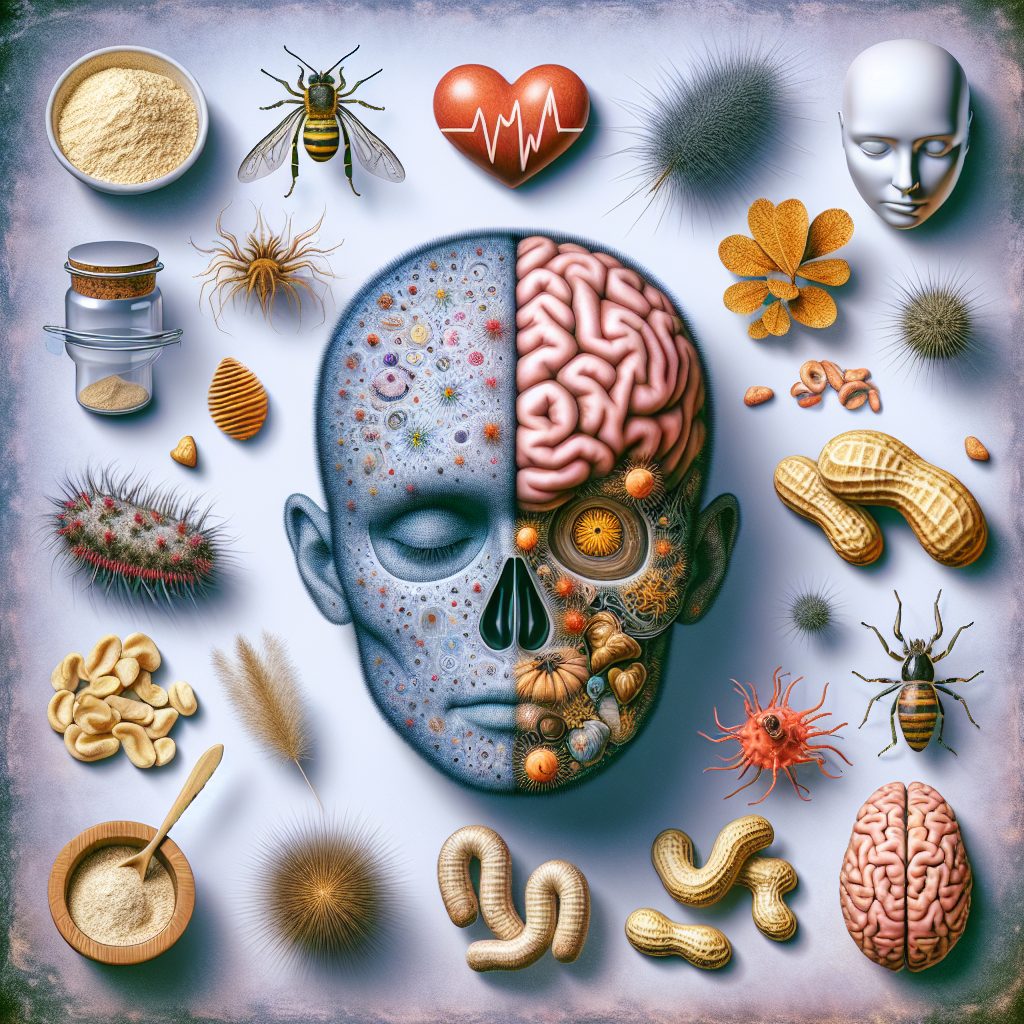
The subject of allergens and mental health is among the hotly debated topics among health practitioners and researchers alike. Allegens are microscopic organisms that may cause allergies in some individuals due to its various forms. Common allergens include pollen, certain foods, dust, and pet dander. When react to allergens, the body produces histamine and other chemicals, which can lead to a range of symptoms, including hay fever, asthma attacks, and allergic eye symptoms.
It is becoming increasingly clear that allergens can also affect mental health. Evidence suggests that allergies can heighten the risk of anxiety and depression. Furthermore, research also indicates that certain allergens can activate the immune system, which can further worsen symptoms of mood, anxiety, and mental illness. Moreover, allergens can have a physical impact on mental health. They can cause disruption of sleeping patterns, fatigue, and headache pain which are associated with mental health problems. As such, it is important to become aware of how allergens can affect mental wellbeing and take the necessary steps to protect our mental and physical health.
Key Takeaways
1. Allergens can have significant implications on mental health, with studies showing that those with respiratory allergies have a higher risk of depression, anxiety and sleep disorders.
2. Allergies can increase inflammation in the brain, ultimately resulting in psychological distress.
3. Allergens in the environment can trigger physical and mental stress responses, resulting in increased psychological symptoms.
4. Allergic sensitivities can be managed by limiting allergen exposure, taking anti-inflammatory medications or implementing psychological interventions.
5. The symptoms of allergic reactions can be similar to mental health disorders, so it is essential to seek professional help to get accurate diagnosis and treatment.
Are Allergies Connected to Mental Health?
Effects of Allergens on Mental Health
An individual’s mental wellbeing is a complex balance, and allergens can affect this as much as lifestyle and social stimuli. Allergens can cause physical reactions, some of which can affect mental cues in the body such as inflammation, oxygen distribution, and the release of hormones. This can in turn lead to behavior and psychological changes such as increased anxiety or depression.
People with allergic symptoms such as a sore throat, head congestion, difficulty breathing, skin rash, or sneezing may also experience difficulty sleeping, moodiness, and increased distraction or forgetfulness.
Histamine Effects on Mental Health
Allergy reactions are often caused by the release of histamine from mast cells located throughout the body. Histamine is a compound in the body that helps to regulate the immune system and is responsible for immune responses to allergens.
When histamine is released it can affect physical and psychological processes including inflammation, muscle response, serotonin production, and the release of cortisol and adrenaline which can all have an influence on mental wellbeing. Histamine can also alter the immune system’s response to common stressors which can affect an individual’s ability to cope in adverse situations.
Respiratory Allergies and Mental Health
Respiratory allergies are one of the most common types of allergies and are associated with a wide range of mental health conditions including asthma, depression, anxiety, and general psychological ill-being. These allergies can cause physical distress including difficulty breathing or shortness of breath, as well as mental distress due to physiological changes as a result of the allergic response.
Studies have linked this type of allergy to a higher risk of mental health issues due to the burden of the condition and the constant, low-level inflammation associated with it.
Food Allergies and Mental Health
Food allergies can have a significant impact on mental health due to the restrictive nature of the condition. Individuals may feel anxious or isolated if they need to avoid certain foods or foods with certain ingredients, or lack confidence to eat outside of the home.
Mood swings, irritability, and disrupted sleep patterns can also result from food allergies due to the physical discomfort they cause, as well as the need to constantly check that foods are safe to eat. Food allergies can also cause anxiety around eating with increased fearfulness when it comes to trying new foods.
Top Tips for Managing Allergens and Mental Health
1. Speak to Your Doctor About Mental Health Concerns
If you experience anxiety, depression or other mental health issues related to allergies, it is important to speak to your doctor. Your doctor can give you information and advice, or refer you to a mental health professional for further support and treatment if necessary.
2. Discuss Treatment Options With Your Doctor
Your doctor can advise on the best course of treatment for any allergy symptoms that may be impacting your mental health. This could include medication to help reduce the symptoms of allergies or immunotherapy to build up your tolerance to allergens.
3. Identify Stressors and Learn How to Manage Them
Anxiety and depression related to allergies can sometimes be caused by stressors such as avoiding certain foods or worrying about how to manage your allergies in certain environments. It is important to identify the source of your stress and learn techniques on how to manage it effectively.
4. Consider Being Tested for Allergies
If you experience mental health symptoms that you think might be connected to allergies, it is worth considering having an allergy test. This will help you to identify any triggers and give you the information on how to manage them appropriately.
5. Make Sure You Are Getting Enough Sleep
Getting enough sleep is an important part of managing allergies and mental health. Aim to get at least seven hours of quality sleep every night as this will help to reduce fatigue and stress which can worsen allergy symptoms.
How do allergies affect mental health?
Allergies can have a negative effect on mental health for a number of different reasons. Allergy symptoms often cause discomfort which can lead to anxiety and stress. Additionally, the loss of sleep due to allergies can lead to fatigue and an inability to concentrate, which can negatively affect mental wellbeing. The fear of having an allergic reaction to certain allergens can affect a person both emotionally and mentally. All of these factors can lead to a decrease in overall mental health.
What are the symptoms of stress or anxiety due to allergies?
Symptoms of stress or anxiety due to allergies can include feeling overwhelmed, difficulty concentrating, restlessness, irritability, and even panic attacks. Symptoms can also include physical manifestations, such as headaches, muscle tension, fatigue, and difficulty sleeping.
How can someone cope with allergies and improve their mental health?
Coping with allergies and improving mental health may involve avoiding exposure to allergens that cause symptoms, taking medication if needed, and engaging in relaxation techniques such as deep breathing and meditation. Additionally, it is important to get support from family and friends and to find healthy ways to manage stress. Talking to a mental health professional can also be beneficial in managing the symptoms.
What lifestyle changes may help with both allergies and mental health?
Making lifestyle changes can help improve symptoms of both allergies and mental health. Eating a balanced diet, exercising regularly, avoiding pollutants, and getting adequate sleep can all help to reduce the negative effects of allergies on mental health. Additionally, participating in activities such as yoga or tai-chi can help manage stress levels.
Are there any natural remedies that can help support both allergies and mental health?
Yes, there are some natural remedies that can help to support both allergies and mental health. Supplements such as vitamin C, quercetin, and omega 3 fatty acids can be beneficial for reducing inflammation and supporting the immune system. Herbal teas such as chamomile, peppermint, and ginger can also help to reduce symptoms of allergies and stress.
How can allergies trigger mental health issues such as depression or anxiety?
Allergies can trigger mental health issues such as anxiety or depression by making existing symptoms worse. The constant discomfort and stress of dealing with allergy symptoms can lead to low self-esteem or feelings of helplessness. Additionally, as allergies can lead to fatigue and difficulty concentrating, this can lead to a decrease in overall mental health and wellbeing.
What should I do if I think my allergies are affecting my mental health?
If you think your allergies are affecting your mental health, it is important to talk to your doctor. Your doctor can help to assess your condition and make recommendations. Additionally, it may be beneficial to talk to a mental health professional who can help to find coping mechanisms and strategies to manage the symptoms.
Can allergies cause anxiety?
Yes, allergies can cause anxiety. The fear of having an allergic reaction to certain allergens can affect a person both emotionally and mentally. Additionally, the discomfort of allergies can often lead to feelings of worry and stress, which can exacerbate existing anxiety symptoms.
What other mental health issues can arise due to allergies?
Other mental health issues that can arise due to allergies include depression, frustration, irritability, and difficulty concentrating. The constant discomfort of allergies and the physical and mental fatigue can lead to low self-esteem and negative mood states. Additionally, severe allergies can have a significant impact on daily functioning, which can further aggravate mental health issues.
What are the long-term effects of allergies on mental health?
The long-term effects of allergies on mental health depend on the severity of the allergies and the amount of exposure to allergens. If the allergies are severe and the individual is exposed to allergens regularly, the mental health effects can be more significant. Anxiety, depression, and fatigue could all significantly affect an individual’s mental health. It is important to take measures to reduce the impact of allergies on mental health by avoiding exposure to allergens, and seeking treatment if needed.
Final Thoughts
Allergies can have a significant impact on mental health, and it is important to take steps to reduce the impact. Avoiding allergens and making lifestyle changes can help to reduce symptoms and improve overall mental health. Additionally, it is important to seek help from a mental health professional if needed. Allergies can have a negative impact on mental health, however it is possible to manage the symptoms and improve overall wellbeing.
Allergies affect many people in different ways, and it is important to take care of oneself. It is important to remember that help is available and that there are ways to reduce the impact of allergies on mental health. With the necessary coping skills and support, it is possible to reduce the impact of allergies on mental health and live a healthy and fulfilling life.



